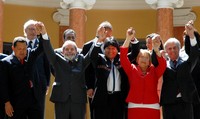Writing on Monday in her new digs over at Foreign Policy, Laura Rozen told the story of how Candidate Obama’s foreign policy brain trust has been largely bypassed in President-elect Obama’s foreign policy team in favor of Hillary Clinton loyalists. My first reaction was basically, Boo-hoo. I can think of worse things than being left stranded in a tenured academic gig. But today Laura followed that piece up with an email from one of her sources for the original piece, explaining the policy implications of what went down: There’s an old saying in Washington: policy is people. This means thatto […]
The Americas Archive
Free Newsletter
The news that Brazil’s uranium enrichment facility, officially inaugurated back in 2006, will become fully operational in a month presents interesting comparisons to Iran’s program. After all, although it isn’t necessarily hostile to the U.S., Brazil has spearheaded efforts to defend and promote emerging nations’ interests vis à vis the West on a global level, and the U.S. on a regional level. (See Peter Kingstone’s WPR feature article for more.) In fact, if I had to choose between which of the two, Brazil or Iran, offers a credible pole around which meaningful challenges to America’s interests and influence might coalesce, […]
In the January/February issue of the Atlantic, that publication’s polymathic literary editor (and former foreign policy analyst at RAND) Benjamin Schwarz takes on what he calls the “dangerous sentiments” about America’s virtually unlimited role in the world that have been held by all recent presidents, regardless of party, including, if one is to judge by his rhetoric and that of his advisers, President-elect Obama: To define, as Obama does, conflict, misrule, nondemocratic states, and noncapitalist economies as threats in themselves; to assert (as did Anthony Lake, Obama’s senior and probably closest foreign-policy adviser, when he served as national-security adviser in […]

Bad policies — and a bad attitude — need improvement to avoid endangering America’s nuclear arsenal, a senior-level U.S. Department of Defense (DOD) task force has concluded. The report (.pdf) warned that any further slippage could compromise the ability of the United States to deter potential threats as well as assure the security of friends and allies. It also offered many recommendations on how to improve DOD nuclear management. The incoming administration of President-elect Barack Obama should consider how to address these proposals in the context of its broader nuclear weapons policies. The report was the second issued by the […]
For anyone who enters the site through the blog, I recommend checking out the new WPR feature issue on South America, titled The Emerging Continent. It includes articles by Shannon O’Neil of the Council on Foreign Relations on the past and future of regional integration; WPR Contributing Editor Anastasia Moloney on the origins of and potential for the South American populist left; and Peter Kingstone of the University of Connecticut on whether or not the continent’s sleeping giant, Brazil, has finally woken up for good. A lot has changed in South America over the course of a decade when America’s […]

In recent years, Brazil has generated a level of international interest and excitement that was wholly unexpected and unpredictable as little as 10 years ago. As one of the so-called BRIC countries — the emerging powers of Brazil, Russia, India and China — Brazil has been drawing increasing attention on a variety of fronts. Brazil’s economy has been growing steadily and solidly since roughly 2002, with low inflation, expanding trade, and gradually declining public debt. As a consequence, the country has been an inviting location for both foreign direct and portfolio investment. Internationally, Brazil has been in the forefront in […]

In the 21st century so far, regional integration has been one of the most notable elements of South American foreign relations. Picking up speed in recent years, the continent’s heads of state have enthusiastically met in numerous summits, promising increased political, economic, social, and development cooperation. Across the spectrum, governments are expanding current integration frameworks and entering into new agreements. Expectations are no less grand. As Brazil’s President Luis Inacio “Lula” da Silva recently stated, “South America, united, will move the board game of power in the world, not for its own benefit, but for everyone’s.” Economic integration is a […]

Just over a decade ago, a sea of supporters dressed in red and lining the streets of Caracas celebrated Hugo Chávez’s landslide election victory in Venezuela, marking a watershed in the Latin American political landscape and signaling the emergence of the so-called populist left in the region. Chávez was subsequently followed by a wave of left-wing leaders elected across the continent — Lula in Brazil (2002), Néstor Kirchner in Argentina (2003), Tabaré Vázquez in Uruguay (2004), Evo Morales in Bolivia (2005), and a year later Michelle Bachelet in Chile and Rafael Correa in Ecuador — leaving roughly 75 per cent […]
For obvious reasons, this lede from Keith Bradsher’s IHT piece describing how the Chinese are cooling to U.S. government debt got me clicking through to the Merriam-Webster definition of the word, “crisis”: China has bought more than $1 trillion in American debt, but as theglobal downturn has intensified, Beijing is starting to keep more ofits money at home — a shift that could pose some challenges to the U.S.government in the near future but eventually may even produce salutaryeffects on the worldeconomy. Theword has its roots in medical usage, and me being the optimist that Iam, I’d identified it with […]
Shadi Hamid pursues the debate about democracies and foreign policy, pointing out, among other things, that he didn’t describe the foreign policy of democracies as “more stable” (my description) than that of dictatorships, but rather as “stronger, more effective and more predictable.”While he concedes that there’s an implication of stability, he’s also right to point out the distinction. But keeping that distinction in mind, who fits Hamid’s description better over the past eight years, the U.S. or China? Reaching backwards historically, the Soviet Union, too, had a strong, effective and utterly predictable foreign policy. Among Middle Eastern countries, I’d propose […]
